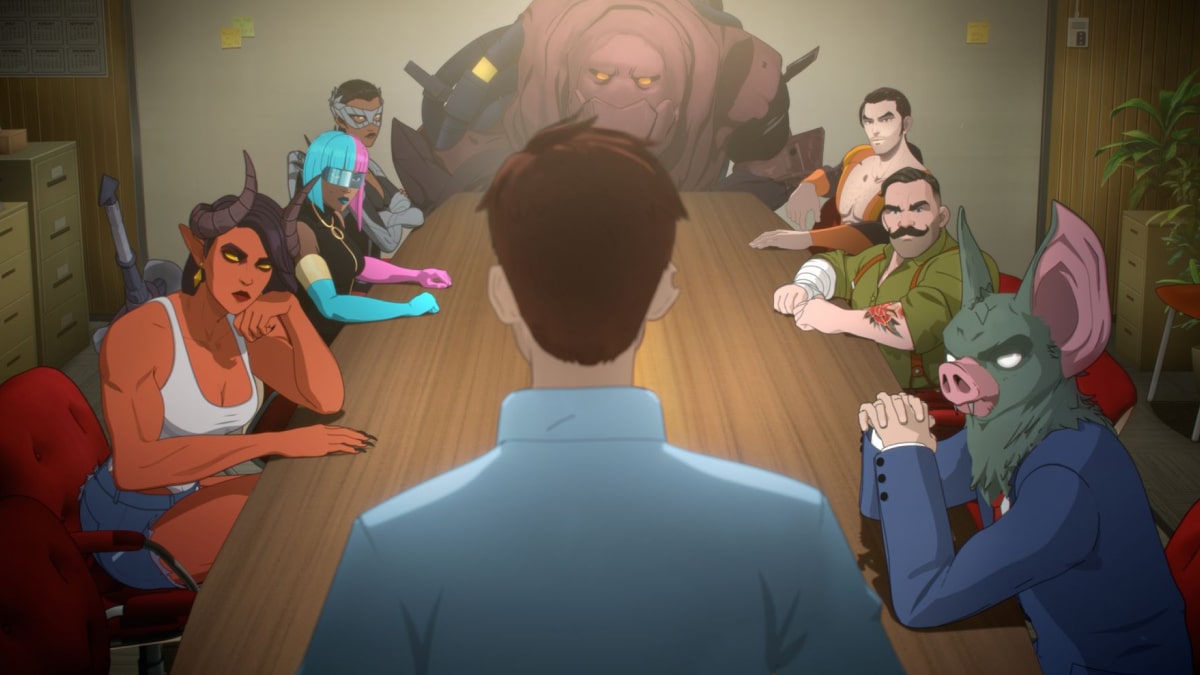I was reticent to even write this review of Adhoc Studio’s Dispatch. If you’re so inclined, I’d encourage you to experience this episodic adventure in the same way I did; with minimal prior knowledge and nothing but the store description and the Game Awards trailer to go on. Website engagement stats be damned, feel free to scroll down to the bottom of this review, read the verdict and be assured that for fans of the Telltale library of titles, Dispatch is an essential game.
Telling Tales
Still here? Okay then. I think a comparison between Dispatch and the Telltale Games’ episodic titles is unavoidable when writing a review of the former. I don’t want to labour on about it however, so I’ll get it out of the way with early.
Dispatch does feel like a spiritual successor to the likes of The Wolf Among Us and Batman: The Telltale Series. That’s partly because Adhoc Studios was founded by Telltale veterans after the unfortunate demise of the prolific California-based studio. You can feel the strongest elements of Telltale’s narrative DNA shining through in every facet of Dispatch.
The comparison is most readily drawn because Dispatch follows much of the same formula that Telltale games championed during the 2010’s, however. An episodic structure. A branching narrative where decisions matter, both big and small. “X will remember that” prompts after making choices. An art style inspired by comic books and animation. Quick Time events challenging the player to react swiftly. They’re all present and correct in Dispatch.
There are significant differences between Dispatch and the Telltale games however. Telltale’s catalogue were as much a point-and-click adventure as they were a choose-you-own-adventure book, with sections where you would control the movement of a character to explore an area. As time went on, these portions of the Telltale games became their weakest. Adhoc Studios have done away with that entirely for Dispatch. It instead chooses to focus entirely on world building, head-scratching puzzles and its narrative. It’s all the better for it.
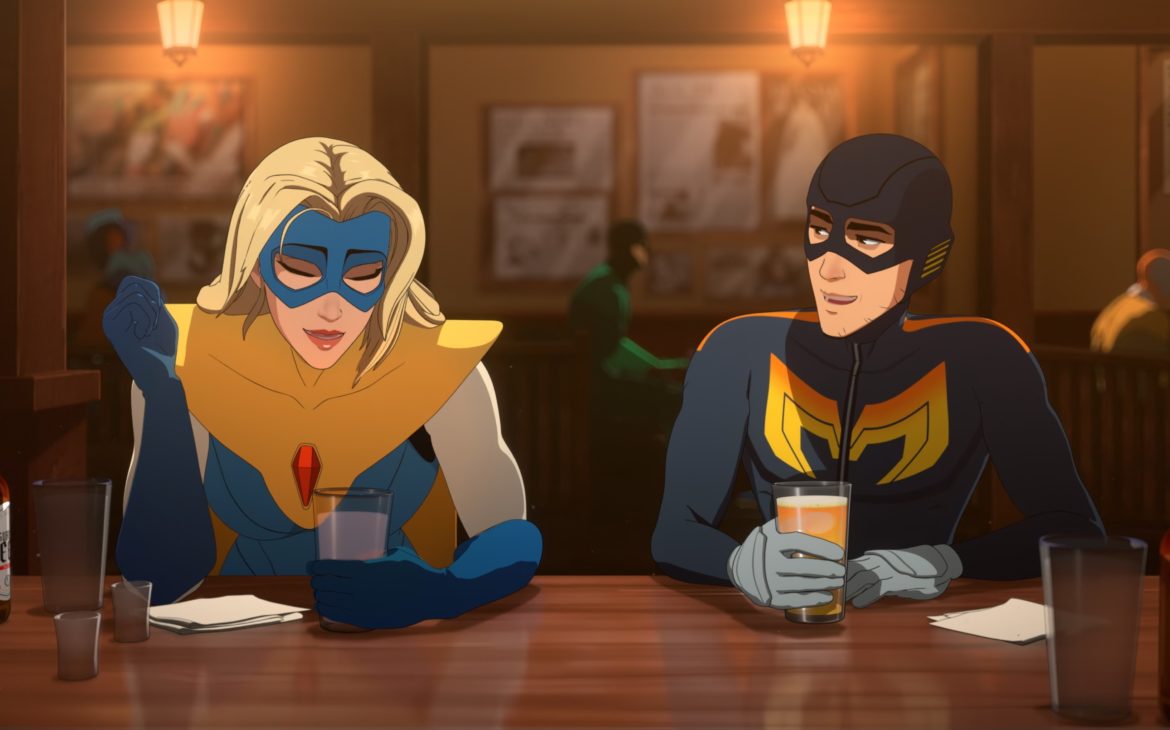
Superhero Dispatch Network, At Your Service
In Dispatch, you shape the dialogue and decisions of Robert Robertson, the third. In a world where super powered heros and villains are common place, ‘normie’ Robert has held his own for years as the pilot of Mecha Man Blue, a Gundam-like suit that he uses to fight crime.
When Mecha Man’s arch nemesis Shroud ambushes the hero, resulting in the destruction of the suit, Robert is close to hanging up his cape. That is until he is recruited by Blonde Blazer, a noble superhero, to become a dispatcher at the Superhero Dispatch Network (the SDN).
A commercialised ‘hero-for-hire’ service, here Robert is tasked with developing the Z-Team, the product of the Phoenix Program, an initiative that gives villains a second chance to do some good. Everything detailed above happen’s in Dispatch’s first episode. Being an interactive story first and foremost, I won’t spoil any further story beats.
Instead, I will say that across the game’s 8 chapters, you’ll meet a cost of colourful characters that are a pleasure to get to know and watch grow. Despite their super abilities, Dispatch avoids the pitfalls of presenting two-dimensional heroes and villains, giving each and every character surprising depth and an arc of development. While the primary characters each have intertwined stories that are the pinnacle of the experience, even the supporting characters of Dispatch evolve from from resentful foil into a supportive friend.
A Critical Role
These characters are brought to life by an expertly crafted script. Landing somewhere between the smart-mouthed best in Marvel’s cinematic universe and the maturity of the likes of Invincible or The Boys, Dispatch sets its own unique tone. The dialogue, world and choices of Dispatch are of a constant high quality, setting high stakes while maintaining character continuity.
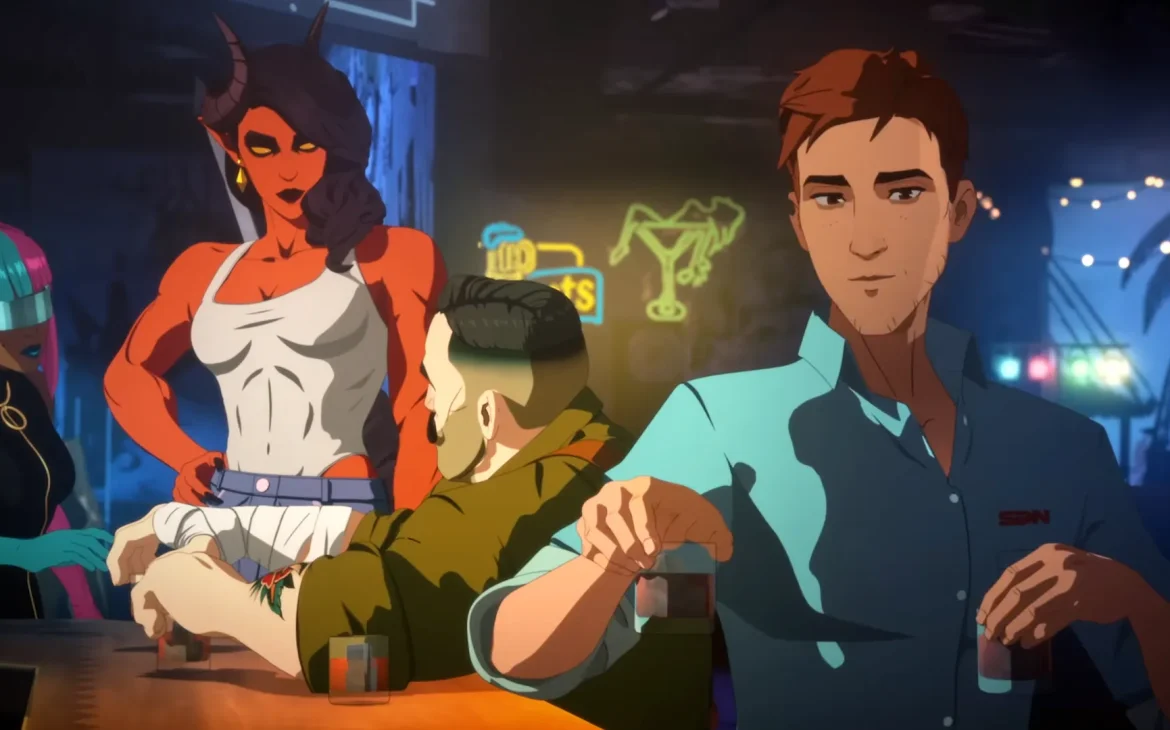
The care that Adhoc Studio have taken to respect player decisions throughout Dispatch is palpable too. Replay the game a few times to experience the outcomes of different branches of the narrative and you’ll see sections you might have otherwise locked out. These might be something as simple as an additional voice line because a character is acting upon an exchange in the past, or a completely different conversation entirely. Some of these decisions are binary, others are cumulative based on multiple interactions, but combined, they give the impression that Robert (and thus, the player) is having a powerful influence on the way the story progresses. These choices all culminate in the final chapter where the same confrontations will play out, but decisions made chapters earlier will influence how it plays out.
Being a character-focused narrative, a great script is only as good as the vocal performances. Those you’ll find in Dispatch are world class and a new pinnacle for interactive storytelling. Given that many of the Critical Role team, veteran voice actors in their own regard, are involved here, you might expect as much. Laura Bailey, Erin Yvette, Alanah Pearce, Travis Willingham and Matthew Mercer all do what they do best – top quality voice acting.
What’s most surprising is how unrecognisable some of the performances are. Voices you might think you would recognise from other games or media embody the character much more so than I was expecting. For example, after a while, I stopped hearing Aaron Paul (Breaking Bad, Bojack Horseman) and started hearing just Robert Robertson. I genuinely had no idea that Jeffrey Wright (Hunger Games, Westworld) lent his voice to this game, given how differing his role is here compared to his usual work, until I saw the credits. Seán McLoughlin AKA content creator Jacksepticeye does a fantastic job, as does voice acting newcomer (although experienced and top quality vocalist) Thot Squad. Here I would usually point out any weaker performances, but there aren’t any. The cast, performances and the direction here is incredible.
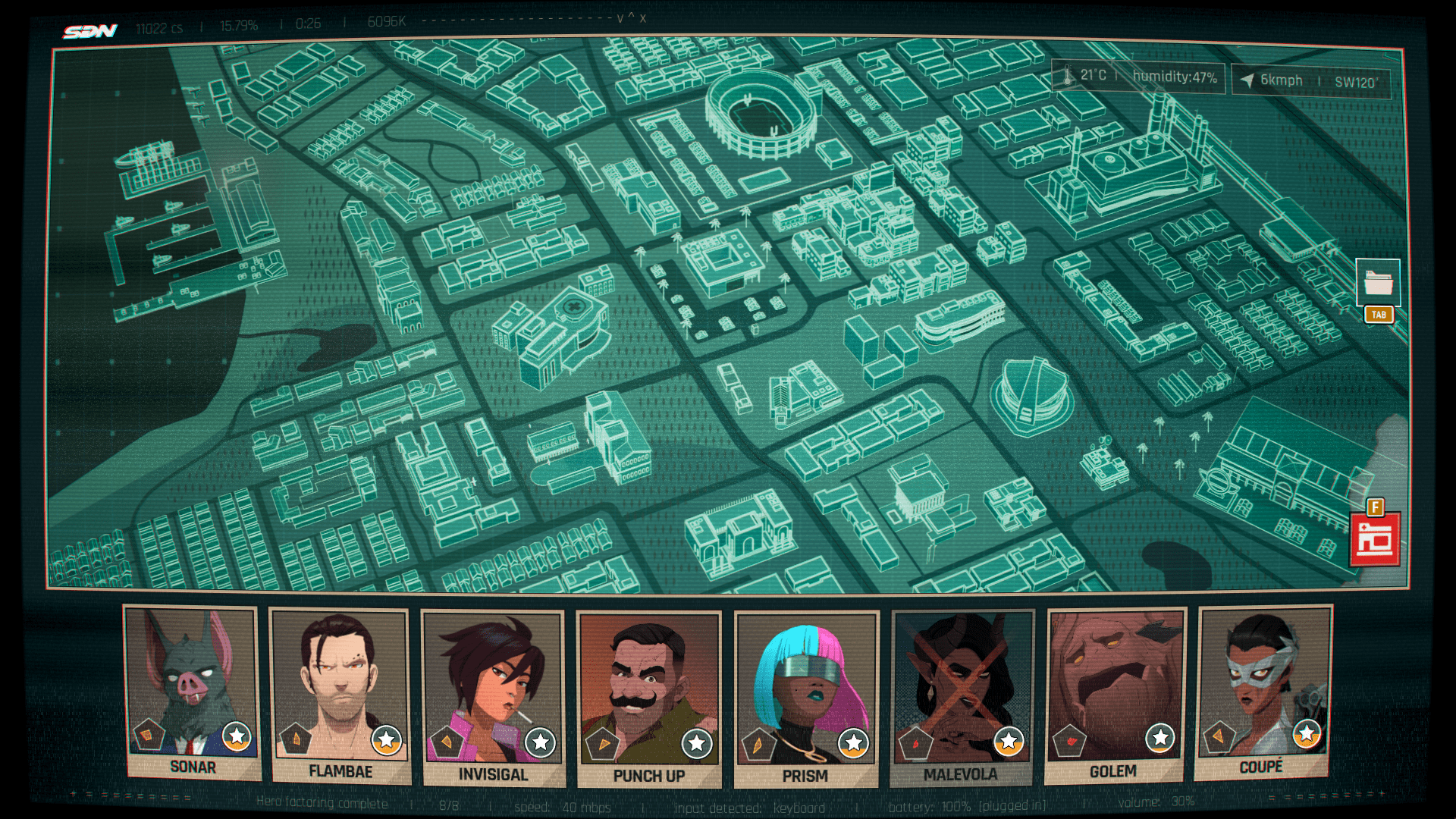
Right Person, Right Place
While most of Dispatch’s narrative is played out during what are essentially interactive cutscenes, it is also implemented during the puzzles and management mini-games. During every episode of the game, Robert will take his place as ‘the man in the chair’ and complete a shift, tasked with directing his roster of Z-Team heroes to jobs that are being called in across a map.
The idea behind these mini-games is to dispatch the most appropriate characters to meet the needs of the job. When opening up the job, you’ll see a short blurb about what the job will entail. These will state requirements like “Defeat the Red Ring villains” or “Defuse the bomb”. It’s up to you as the player to interpret these instructions and try to match them to a hero or heroes. Each of your heroes has particular stats like Vigor, Intelligence and Charisma which are shown on an area graph. Once dispatched, these area graphs are overlayed against the needs to the job and a hockey puck is let loose within the boundary. If that hockey puck lands within the overlap, the job is successful. If not, it’s classed as a failure and your hero might become injured, hindering their stats for the rest of the shift.
These Dispatch sections become more and more complex as you progress through the chapters. Initially, it’s as simple as balancing the availability of your roster, who needs to rest after completing each job, against the jobs that are popping up. In later chapters, you’ll see jobs which automatically fail if you send a hero with a stat which is too strong in a particular area, or will grant additional experience if you do.
As you progress through the chapters, you’ll be able to use experience to tailor your hero squad. Your heroes level up after they gain enough experience, and you can increase their stats however you see fit. This adds a surprisingly moreish element which blends seamlessly with the narrative. As you grow to like the ragtag group of ex-villains you’re now managing, they become all the more useful to you during the mini-games.
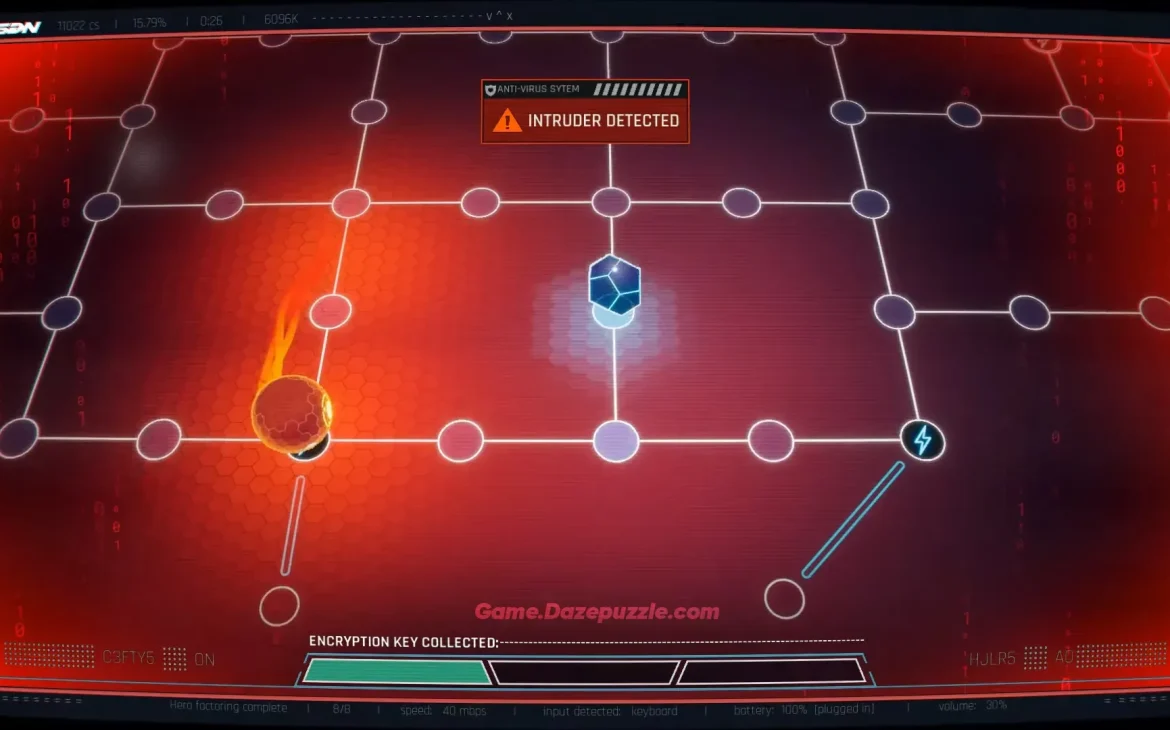
DDOS – Dispatch Denial of Superhero
Robert will also be able to put his history with computers as Mecha Man to use during his dispatching career too. During each chapter of Dispatch, there is are a number of hacking mini-games. These task you with moving a shape around a maze of nodes in order to reach a green exit zone.
At first, these are quite simple. You move around to locked nodes and enter the directions that are shown on screen to unlock the path forward. Much like the dispatching element of the game, these get far more complex as you progress through the chapters. First come time limits, which push you to work quicker. Some systems have anti-hacking protocols which send out orange orbs to chase you down. Later, there are ways to take electronic charges from one node to another in order to rotate parts of the path.
While these hacking mini-games do add variety to Dispatch, they’re easily the weakest element of the whole game. This is particularly true in the last few chapters when you’re moving around a net of nodes trying to match up a frequency wave which corresponds to a particular spot. Thankfully, many of these hacking games are optional, and all of the mandatory ones are reasonably enjoyable.
A Shroud of Light & Sound
One of the criticisms of the Telltale games in their latter days was that the animation had become stilted and that the engine was struggling to keep up with the artistic direction. Those aren’t criticisms you could direct towards Dispatch.
Presented in a glorious comic-book and anime inspired art style, it’s a beautiful game to look at. Character animation, whether it’s sat around a boardroom table or during fast paced battles, is fantastic and realistic. All of this is presented without a dropped frame or stuttering on PS5. The soundtrack to the game is also spectacular, matching the tone of each of the episodes. Personally, I’ve been repeatedly listening to Thot Squad’s ‘Pound Cake’ since Dispatch introduced me to it.
While the studio that created Dispatch is called Adhoc, I hope that interactive storytelling of this quality become anything but. This game sets a new high bar for the genre taking a formula that was on life support and refreshes it, evolves it and proves that these episodic stories can still shock you, make you fall in love, and force a tear to your eye. If you liked the Telltale games, Dispatch is essential. If you didn’t like the Telltale games, Dispatch trims the fat to present an ‘all killer, no filler’ approach to super hero narratives that’s worth your time. It belongs shoulder to shoulder with Invincible, The Boys and One Punch Man, never mind The Wolf Among Us or The Walking Dead. My choice of GOTY was going to be a difficult decision until recently. Now, there’s only going to be one choice.
Dispatch is available now on PS5 (Review Platform) and PC.
Developer: Adhoc Studio
Publisher: Adhoc Studio
Disclaimer: In order to complete this review, we purchased a copy of the game. For our full review policy, please go here.
If you enjoyed this article or any more of our content, please consider our Patreon.
Make sure to follow Finger Guns on our social channels –Twitter, Facebook, Twitch, Spotify or Apple Podcasts – to keep up to date on our news, reviews and features.
